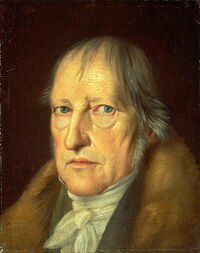 Georg Wilhelm Friedrich Hegel (August 27, 1770 – November 14, 1831) was a German philosopher and, with Johann Gottlieb Fichte and Friedrich Wilhelm Joseph Schelling, one of the representatives of German idealism.
Georg Wilhelm Friedrich Hegel (August 27, 1770 – November 14, 1831) was a German philosopher and, with Johann Gottlieb Fichte and Friedrich Wilhelm Joseph Schelling, one of the representatives of German idealism.Hegel influenced writers of widely varying positions, including both his admirers (Bauer, Marx, Bradley, Sartre, Küng), and his detractors (Schelling, Kierkegaard, Nietzsche, Heidegger, and Russell). Hegel discussed a relation between nature and freedom, immanence and transcendence, and the unification of these dualities without eliminating either pole or reducing it to the other. His influential conceptions are of speculative logic or "dialectic," "absolute idealism," "Spirit," the "Master/Slave" dialectic, "ethical life," and the importance of history.
According to M. James Sawyer, Hegel's Philosophy of History gave the structure adopted by the emerging schools of biblical criticism, as well as the mental cast to the entire century.
Paul Tillich, in his A History of Christian Thought, says that it is nonsensical for people to say that it was first Martin Luther then Hegel who produced Nazism.
It is nonsense, because even if Hegel said that the state is God on earth, he did not mean the the power state. He meant the cultural unity of religion and social life organized in a state. In this sense Hegel could say there is a unity of church and state. But for him "state" is not the party movement of the Nazis, or a relapse to a tribal system. State for him is organized society, repressing sin.
More...


No comments:
Post a Comment